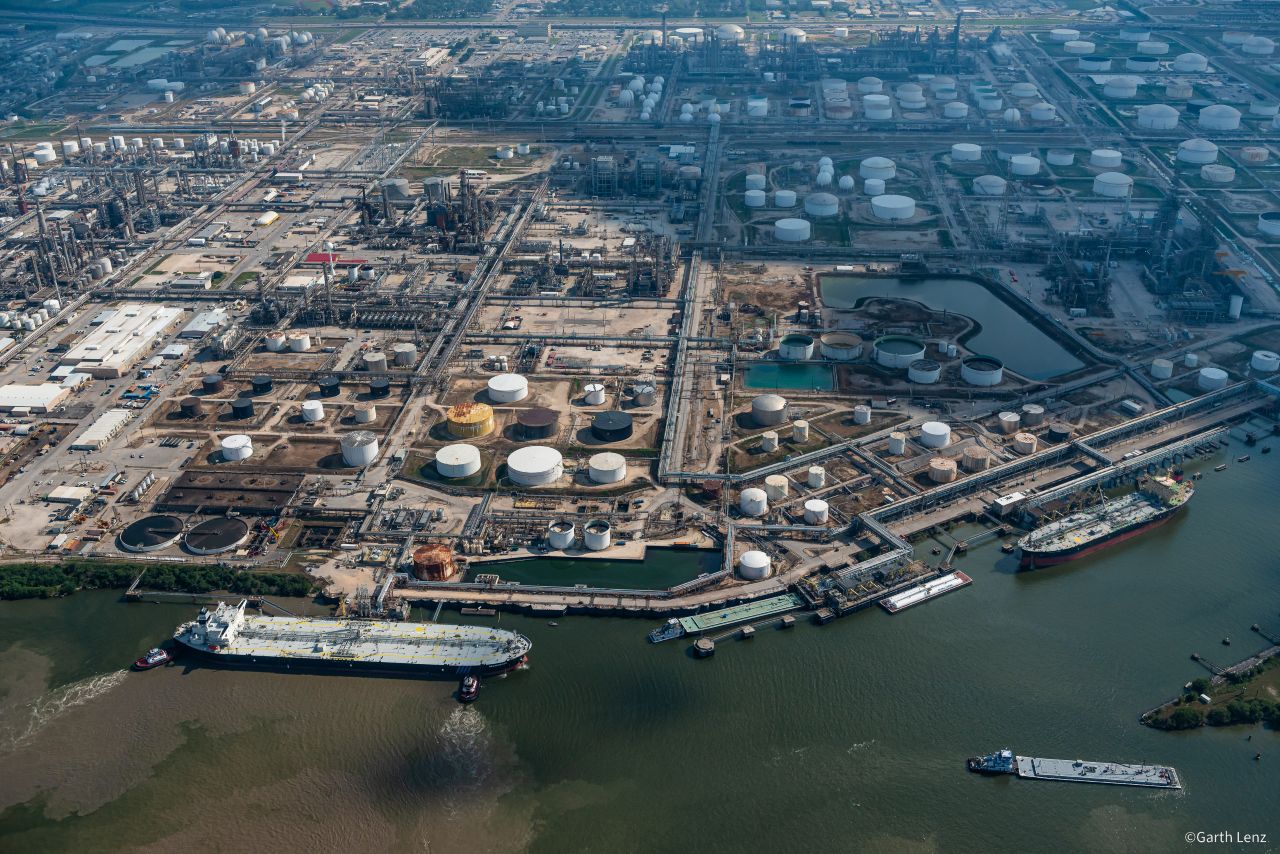Report calls chemical recycling a ‘dangerous deception’ meant to shield the plastics industry

A growing form of plastics reprocessing often touted as “advanced recycling” is mainly a public relations campaign to prolong the life of fossil fuel-based plastics, according to a new report by the environmental group Beyond Plastics.
The report, “Chemical Recycling: A Dangerous Deception,” takes aim at chemical plastics recycling, a rapidly-spreading industry with 11 facilities operating across the U.S. that turn plastic waste into fuel or raw ingredients for new plastics. At least 31 more of these facilities are planned or in some phase of the permitting or construction process, according to data available in the Oil & Gas Watch database.
Chemical recycling leads to energy waste and toxic air and water pollution, often in minority neighborhoods and low-income areas already struggling with a heavy industrial presence, the report states. Also, despite industry claims of being environmentally friendly, chemical recycling produces a dirty form of fuel and chemical byproducts that require expensive refining processes to convert them into new plastics.
The plastics industry uses chemical recycling as an excuse – a public relations ploy – to avoid proposals to ban or reduce certain forms of plastic packaging, such as plastic bags or polystyrene foam, said Judith Enck, Beyond Plastics’ executive director and a former regional administrator for the U.S. Environmental Protection Agency.
“The plastics lobbyists need an answer,” Enck said. “They can't just say, ‘Don't pass packaging reduction.’ They say, ‘Don't pass packaging reduction because we have chemical recycling to the rescue,’ and we really don’t.”
In the past, the plastic industry has used greenwashing techniques to promote conventional plastic recycling, according a former plastic industry lobbyist featured in the report. Lewis Freeman, former vice president of government affairs for the Society of the Plastics Industry (SPI) from 1979 to 2001, recalls in the report’s foreword the conversations that prompted aggressive advertising campaigns around plastic recycling.
“Plastics executives wanted SPI to advertise its way out of plastic’s growing public relations problem as society began realizing the environmental pollution created by the material,” Freeman wrote. “Despite knowing that plastic recycling couldn’t realistically manage a significant amount of plastic waste, companies spent millions of dollars convincing the public otherwise.”
Chemical plastics recycling generally takes two forms – pyrolysis and gasification. Pyrolysis involves heating plastic waste in the presence of a catalyst that speeds the reaction, breaking down plastic into smaller molecules that form liquids and gases that can be used for fuel. It takes place in a chamber that isolates the process from oxygen or steam. Gasification is similar but uses higher temperatures and steam and produces heat and a gas byproduct, but no liquid fuels.
Both processes require major inputs of energy and produce vast amounts of pollution, including hazardous waste. Most of the time, the liquid end-product is pyrolysis oil, similar to petroleum, which is often simply burned for fuel in the same facility that generated it. Rarely do chemical recycling plants actually recycle waste plastic into new plastic, the report states.
The 161-page report examines the 11 existing chemical plastics recycling plants in the U.S. Combined, these can only process approximately 460,000 tons of waste annually, or 1.3 percent of the plastics waste generated in the U.S. That figure assumes these plants are running at full capacity; in reality, many of them provide little information on how much and what kind of waste they accept, or how much output they’re producing.
Of those 11 facilities, four are only operating at a pilot or demonstration scale, with another four only partially or intermittently operating, the report states. Eight facilities have no publicly available data about how much plastic they have already processed. Ten out of the 11 have no data available on the exact type and amount of product they have produced.
The report describes chemical plastics recycling as mostly a public relations maneuver for the fossil fuel and plastics industries. Enck said even conventional plastics recycling, also known as mechanical recycling, has not lived up to its promises.
“The plastics industry knows that it has a big problem,” Enck said. “And they've spent decades deceiving the public into thinking that plastic recycling is the answer. It's not, and they know it's not.”
Craig Cookson, a senior director at the American Chemistry Council, disputed Enck’s characterization of the industry during an Oct. 24 hearing at the New York State Legislature, where a bill is under consideration that would require producers to reduce their packaging by 50 percent over 12 years.
“Plastics recycling does succeed where people get their plastics into the bin,” Cookson told legislators. He was talking about the recycling of certain plastics, such as polyethylene terephthalate (PET) or high-density polyethylene (HDPE), labeled as #1 or #2 plastics with a circular arrow symbol.
“Oftentimes it’s lack of access,” Cookson said. “If you get them in a recycling bin, they can be recycled and they will be recycled, they all have great markets around the country.”
However, researchers often report dismal results for plastic recycling on the whole. A 2022 report by Greenpeace found that only about 5 percent of plastic waste in the U.S. is recycled. One 2017 study published in the journal Science Advances found that of the 8.3 billion metric tons of new plastics ever produced, only 9 percent has been recycled. Another 12 percent was incinerated, with the remaining 79 percent piling up in landfills or in the natural environment.
Last week, New York’s Attorney General Letitia James sued PepsiCo for contributing to a public nuisance by generating plastic waste that is fouling the Buffalo River and contaminating drinking water for New York City.
Though Enck considers plastics recycling an “abysmal failure,” she stressed that people should continue recycling metal, paper, glass, yard waste and food waste, which all have viable uses when recycled or composted properly.
Beyond Plastics is far from the only organization casting a skeptical eye on the chemical recycling industry. A September report by the Nordic Council of Ministers found that chemical recycling could only at best process 3 percent of the global plastic waste generated in 2040.
Last week, delegates of governments from around the world met in Nairobi, Kenya, to negotiate details of a binding treaty on reducing plastic pollution. Several scientists and civil society groups criticized the talks, saying treaty talks are progressing too slowly and blaming fossil fuel- and plastics-producing countries for stalling negotiations.
“These negotiations have so far failed to deliver on their promise laid out in the agreed upon mandate to advance a strong, binding plastics treaty that the world desperately needs,” Ana Rocha, global plastics policy director of the Global Alliance for Incinerator Alternatives, said in a statement following the conference.
That meeting builds on progress made following the 2019 Basel Convention on plastic waste, an international treaty signed by 191 countries that requires plastic waste exporters, such as the U.S., to obtain consent from other countries before shipping waste to them. In the process of updating the treaty, delegates from more than 50 countries objected to language about chemical recycling being considered legitimate. Delegates ended up putting a chapter on chemical recycling in brackets in an annex to their guidance, “therefore the inclusion of chemical recycling in the guidance was not agreed to and has no guidance status,” the Beyond Plastics report states.
“We saw a really significant number of other countries, particularly in the Global South, developing countries, reject the idea of adopting this technology,” said Lee Bell, a policy advisor for the International Pollution Elimination Network and one of the report’s authors. “Because their concern is that once there's a foothold for this type of technology, they will find themselves the recipient of processing facilities, the hazardous waste and the emissions and they don't want it.”
In the U.S., one policy solution to plastic waste that is gaining traction is called “extended producer responsibility,” which would hold the companies that produce plastics legally responsible for their product over its entire life cycle, including disposal. Maine, Oregon, California, and Colorado have all passed laws intended to make plastics producers pay more for recycling their waste, often through third-party nonprofits known as producer responsibility organizations supported by fees on industry. On Oct. 25, U.S. Rep. Jared Huffman, a California Democrat, and Oregon Democratic Sen. Jeff Merkley introduced legislation that would create an extended producer responsibility on a federal level and ban single-use plastics that are not recyclable, among other measures.
“What it should mean is not just money for recycling,” Enck said. “That's the traditional approach. We want money for recycling, but, more importantly, we want environmental standards for packaging. … You can throw all the money in the world at plastics recycling, it’s not going to solve the problem.”
Lead photo:















